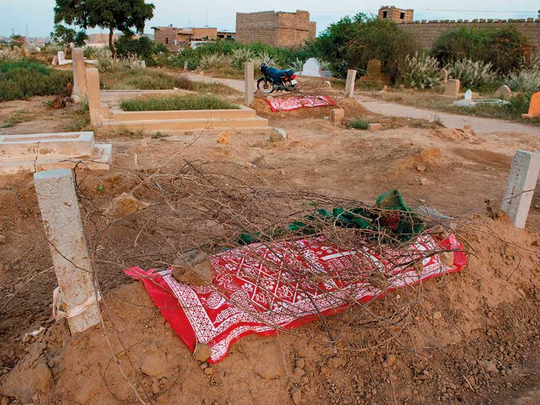
Karachi: The night Ghani Rehman was condemned to die, his father asked if they could share a last meal together. But Ghani excused himself, preferring to wait in his room. His sisters came to see him, and he gave them each a small token to remember him by: a plastic-wrapped mint drop.
The 18-year-old boy knew what was coming. Less than 24 hours earlier, the neighbour’s 15-year-old daughter Bakhtaja, with whom Ghani had tried to elope from Ali Brohi Goth, their poor neighbourhood of Karachi, had been tied down and electrocuted.
His father finished dinner, then returned. With the help of an uncle, he strapped his son to a rope bed, tying one arm and one leg to the frame with uncovered electrical wires.
Bakhtaja had endured 10 minutes of searing electrical jolts before she died. The boy took longer, and eventually the uncle stepped in and strangled him. The couple were buried in the dead of night.
In Pakistan, illegal so-called “honour” killings are a pandemic, and women its predominant victims. More Pakistani women are murdered at the hands of close family members for supposed immoral behaviour than Pakistani civilians are killed by terrorism.
Still, the murders in Ali Brohi Goth shocked Karachi, the country’s largest city. The sheer brutality was unusual, and while domestic violence is rife and “honour” killings do occur in the city, they are almost exclusively reported in rural areas where village councils run parallel judiciary systems.
“There are pockets in Karachi where tribal culture is being followed but we had no idea it was to this extent,” said Mahnaz Rahman, resident director of Auraf Foundation, a women’s rights group. Outside a secularised middle class, some communities are becoming more entrenched in their conservative values, she said.
The Human Rights Commission of Pakistan has reported an average of 650 “honour” killings annually over the past decade. But since most go unreported, the real number is likely to be much higher.
Ghani and Bakhtaja had known each other since childhood. She lived on the second floor of a newly built villa, overlooking the dusty patch of ground where Ghani’s family had a brick home, and from where he would catch her eye when she stood on the balcony.
During a recent visit to Ali Brohi Goth, a horde of children played in front of Ghani’s family’s home, and teenagers flew kites off a precipice.
According to a police report, citing Bakhtaja’s uncle, the two teenagers had an “affair”, though it was unclear what that implied.
Ghani had a reputation as a hard-working, well-mannered boy who held two jobs. Men in the neighbourhood, where social customs keep women inside the house, didn’t know much about Bakhtaja. When asked if he could describe her, one relative said: “If I knew, I would be dead too.”
Ghani had tried several times to get permission to marry her, but was rebuffed. Eventually, the pair fled, with cash and jewellery she had stashed away.
They had made it to Hyderabad, three hours west, when Bakhtaja’s father called and said the families had agreed to the marriage and would let them return safely. It was a trick.
The fathers had, in fact, come to a settlement. Muhammad Afzal, Ghani’s father, had pledged to give Hikmat Khan, Bakhtaja’s father, two of his own daughters, a cow, and PKR 500,000 (Dh16,590) for the wedding. They meant to keep the agreement a secret.
But an older relative, Sirtaj Khan, got wind of the deal and exposed it to the community, insisting that the couple be put to death. Instead of braving the supposed public embarrassment, the fathers agreed with Khan to make an example of their children.
“He is an evil-minded person,” one local resident said of Khan.
While the fathers and two uncles were subsequently arrested, Khan fled for Kunar in Afghanistan. Ghani and Bakhtaja’s story was retold by neighbours, relatives and police.
In Karachi, murders within the family, though rarely publicised, are becoming more common, said Zia Ur Rehman, a journalist with the News who broke the story.
“Immigrants bring their own culture, rules and other things with them when they move to urban centres,” he said. “In Karachi, instead of going to regular courts, some tribal people adopt their own traditional way of justice.”
Bakhtaja and Ghani are buried 10 metres apart in the local cemetery, their graves dug between shrubs and covered with red cloth still not faded by the sun and dust. Ataullah, a gravedigger, said the bodies were charred from burns when they were lowered into the ground.
Female relatives of the couple, who were not available for interviews, were “removed” from their houses when punishments were meted out, neighbours said. After the murder, Bakhtaja’s mother told human rights defenders: “I forgive him,” meaning her husband.
“The women are vulnerable and scared. They want their men back,” said Rahman, of Aurat Foundation. The arrest of the culprits left the women without financial support. Yet they don’t seem to condone the actions of their husbands.
“The girl’s mother is in a very bad state. She has stopped speaking,” said one relative who wished to remain anonymous.
Ten days after the murders, Karachi was hit by heavy monsoon rains that flooded the streets with muddy water and wrought havoc on the city. Dozens of people were electrocuted. It was God’s punishment for killing the teenage couple, the local women told each other.












